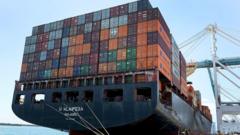The imposition of aggressive tariffs by President Trump has led to heightened tensions in global trade, prompting swift responses from both allies and adversaries. Economic analysts warn of potential recession as markets react to instability.
Trade Turbulence: The Global Impact of Trump's Tariffs

Trade Turbulence: The Global Impact of Trump's Tariffs
President Trump's latest tariffs spark fears of a global recession as U.S. allies brace for retaliatory measures.
President Trump’s tariffs officially came into play early this morning, imposing severe levies on nearly all U.S. allies and driving import taxes on Chinese goods beyond 100 percent. Trump’s administration claims that over 70 nations are seeking negotiations with the United States, with discussions set to commence with Japan and South Korea soon. In retaliation, China has instituted its own tariffs, while the European Union is strategizing countermeasures against American products, anticipated to launch next week. The rising tensions surrounding these developments have stoked fears of a devastating trade war, with international stock markets already displaying reality checks from the mounting economic pressures.
Market activity has been particularly volatile; while the S&P 500 experienced a significant surge at the opening bell, it ultimately fell by 1.6 percent, edging closer to a bear market threshold. Financial analysts attribute this market decline, partly, to an underestimation of Trump's commitment to enforcing harsh tariffs. Meanwhile, Asian markets also experienced downturns amidst heightened uncertainty.
The automotive sector is reeling from Trump’s recently enacted 25 percent tariffs on foreign cars, spurring many companies to halt shipments to the U.S., subsequently leading to factory closures and layoffs across American and foreign plants alike.
Elon Musk has publicly criticized Trump’s chief trade advisor, exacerbating tensions within the administration regarding tariff implementation. In a response to comments made by Vice President JD Vance regarding "Chinese peasants," China's foreign ministry called the remarks “ignorant” and “impolite.” In a concerning development, U.S. tax authorities have decided to provide sensitive tax data of immigrants to security agents implicated in deportation efforts.
Executives in the oil and gas sectors, while remaining publicly supportive of Trump, have expressed growing apprehensions in private discussions over the long-term implications of the tariff strategies. Concurrently, Trump has issued numerous executive orders designed to bolster coal production, further casting uncertainty over the future of American energy. As the administration moves forward, both economic and global stability hang in the balance.






















